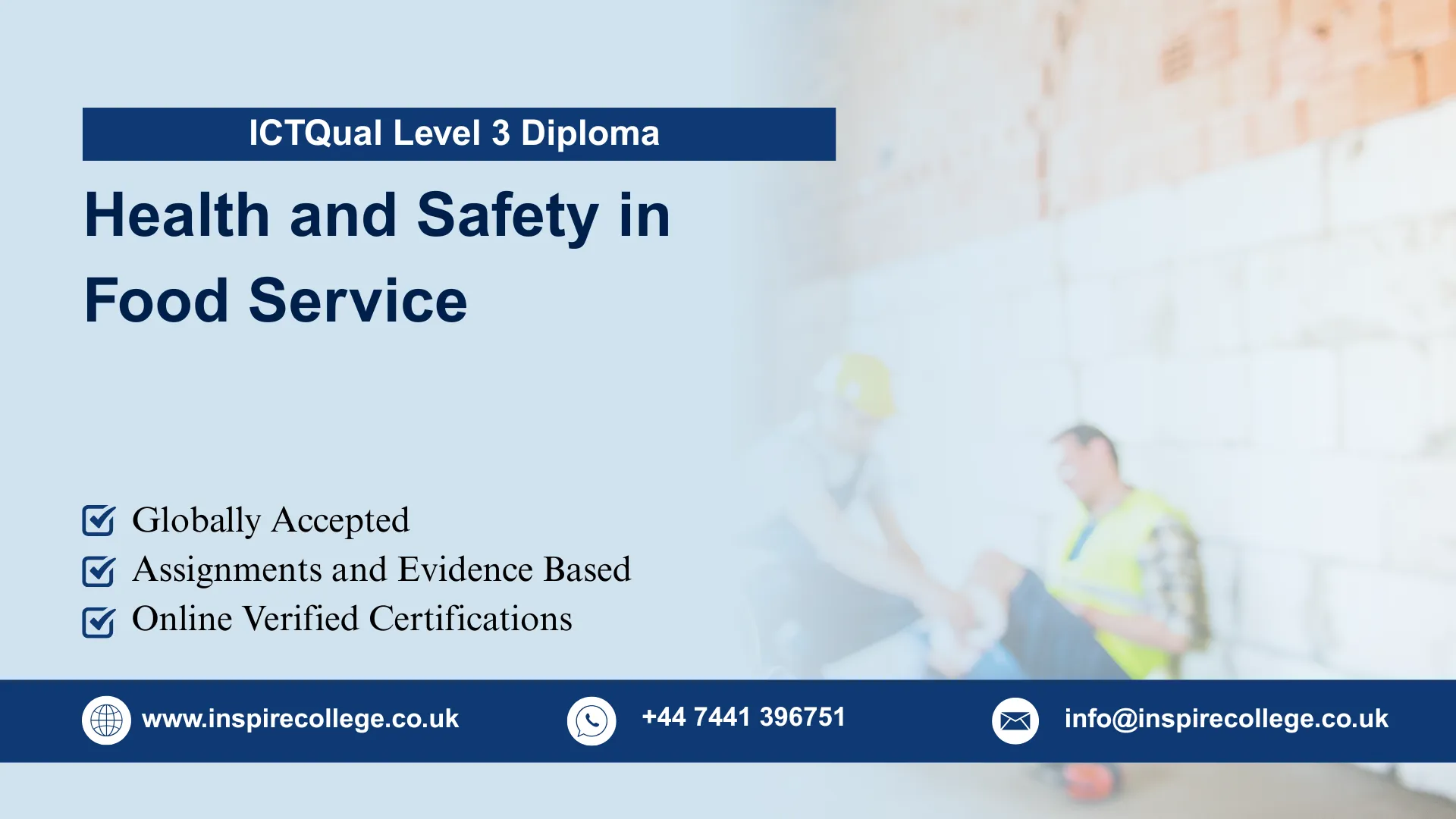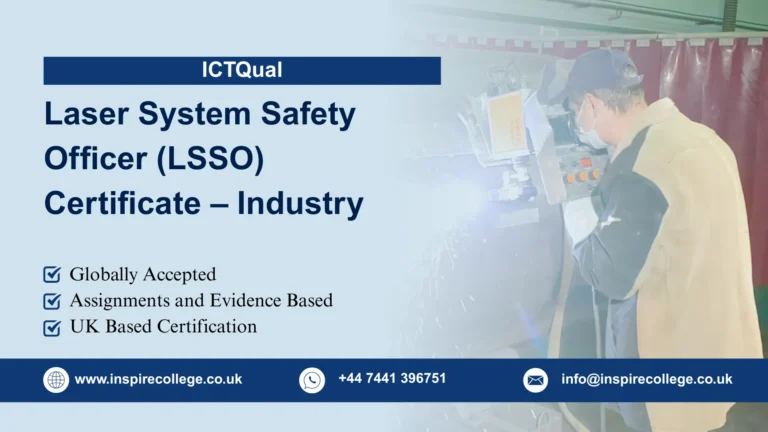
ICTQual Level 3 Diploma in Health and Safety in Food Service
Ensuring rigorous health and safety standards in food service is essential for protecting customers, staff, and organisational reputation. The ICTQual Level 3 Diploma in Health and Safety in Food Service is a comprehensive qualification designed for individuals who wish to advance their expertise in food safety management, regulatory compliance, and supervisory practices within professional food environments.
ICTQual Level 3 Diploma in Health and Safety in Food Service provides learners with in-depth knowledge of advanced food safety principles, including HACCP planning and implementation, international food safety standards, risk assessment, and emergency management. Participants will explore complex regulatory frameworks, understand the legal responsibilities of food service operations, and develop the skills needed to lead and train food handlers effectively.
Through a combination of theoretical learning and practical application, learners will gain the competence to monitor, evaluate, and improve food safety practices in diverse food service settings such as restaurants, catering services, institutional kitchens, and hospitality operations. ICTQual Level 3 Diploma in Health and Safety in Food Service emphasises proactive risk management, staff supervision, and the development of a strong food safety culture, equipping learners to make informed decisions that ensure compliance with national and international standards.
Ideal for aspiring managers, team leaders, supervisors, and experienced food service professionals, the ICTQual Level 3 Diploma enhances employability, career progression, and professional credibility. By the end of the program, learners will possess the advanced skills, knowledge, and confidence to implement effective health and safety strategies, lead teams, and maintain high standards of food hygiene and workplace safety.
To successfully enrol in the ICTQual Level 3 Diploma in Health and Safety in Food Service, learners are expected to meet specific entry requirements that ensure they are well-prepared to engage with advanced course content. This qualification is designed for individuals aiming to deepen their expertise in food safety management, regulatory compliance, and supervisory practices within professional food service environments.
Minimum Age:
- Learners must be at least 18 years old at the time of enrolment.
- This ensures participants have the maturity and professional experience needed to engage with advanced health and safety concepts in food service environments.
Educational Background:
- A minimum of a Level 2 qualification (or equivalent) in a related field such as food hygiene, health and safety, or general education is recommended.
- Learners should have a strong standard of literacy and numeracy to effectively comprehend course materials, complete assessments, and manage reporting tasks.
- This educational foundation allows learners to engage confidently with the more advanced theoretical and practical aspects of the Level 3 diploma.
Experience:
- While prior experience is not mandatory, it is highly beneficial for learners to have worked in a food service environment.
- Relevant experience may include roles in catering, hospitality, food production, or facility management where food safety practices are applied.
- Such experience supports a deeper understanding of course content, practical implementation of safety procedures, and application of supervisory responsibilities.
English Language Competency:
- Learners should possess basic English reading, writing, and comprehension skills.
- Adequate English proficiency ensures participants can fully understand training materials, engage with assessments, and communicate effectively in professional food service settings.
By meeting these requirements, learners can fully benefit from the comprehensive training, practical applications, and career-enhancing opportunities offered by this Level 3 diploma.
Mandatory Units
The ICTQual Level 3 Diploma in Health and Safety in Food Service, to achieve the qualification candidates must complete all the mandatory units form the following :
Mandatory Units
- Development and Supervision of HACCP Systems
- International Certifications: BRC, FSSC, ISO 22000
- Advanced Microbiology and Foodborne Pathogens
- Legal Compliance, Documentation, and Auditing
- Sustainability and Environmental Food Safety
- Final Project: Conducting a Full Food Safety Audit
By the end of this course, learners will be able to:
- Development and Supervision of HACCP Systems
- Understand the principles, structure, and operational importance of HACCP systems in food service settings.
- Develop and implement HACCP plans tailored to the specific needs of an organisation.
- Supervise the effective monitoring and application of critical control points to ensure food safety compliance.
- Evaluate and update HACCP systems based on internal reviews, audits, and incident reports to maintain continuous improvement.
- International Certifications: BRC, FSSC, ISO 22000
- Recognise the purpose, scope, and significance of major international food safety certifications.
- Compare and contrast the requirements of BRC, FSSC, and ISO 22000 standards to ensure organisational compliance.
- Prepare documentation, processes, and procedures to meet certification criteria.
- Support organisations in preparing for external audits and maintaining certification status through effective compliance strategies.
- Advanced Microbiology and Foodborne Pathogens
- Identify major foodborne pathogens, their sources, and routes of contamination.
- Understand microbial growth conditions and apply control measures in food service environments.
- Apply microbiological knowledge to conduct risk assessments and implement preventive measures.
- Interpret laboratory results and implement appropriate responses to maintain food safety standards.
- Legal Compliance, Documentation, and Auditing
- Interpret relevant national and international food safety laws and regulatory requirements.
- Maintain accurate and compliant documentation for all health and safety operations.
- Conduct internal audits to evaluate the performance of food safety systems and identify areas for improvement.
- Prepare corrective action plans in response to audit findings to ensure compliance and continuous improvement.
- Sustainability and Environmental Food Safety
- Assess the environmental impact of food service operations and resource usage.
- Implement sustainable practices to reduce waste, conserve resources, and improve operational efficiency.
- Promote environmentally responsible food safety solutions in line with industry and ethical standards.
- Align food safety practices with broader sustainability and corporate social responsibility goals.
- Final Project: Conducting a Full Food Safety Audit
- Plan and execute a comprehensive food safety audit based on a real-world or simulated scenario.
- Apply knowledge of legislation, HACCP, microbiology, and certification standards in practical settings.
- Identify gaps in existing food safety procedures and provide actionable recommendations for improvement.
- Present audit findings in a professional, structured report suitable for stakeholder review and organisational implementation.
The ICTQual Level 3 Diploma in Health and Safety in Food Service is designed for learners who wish to advance their expertise in food safety management, compliance, and supervisory practices. This course is ideal for professionals seeking to lead food safety initiatives, enhance operational standards, and progress their careers in the food service, hospitality, and catering sectors.
Aspiring Food Safety Managers and Supervisors:
- Individuals aiming to take on managerial or supervisory roles within restaurants, catering services, institutional kitchens, or hospitality operations.
- Learners looking to lead food safety initiatives, implement HACCP systems, and ensure regulatory compliance across teams.
Experienced Kitchen and Food Service Staff:
- Staff already working in kitchens, cafeterias, or catering environments who want to advance their knowledge of food safety, microbiology, and compliance standards.
- Ideal for those aiming to enhance practical skills in auditing, HACCP development, and staff supervision.
Health and Safety Professionals:
- Individuals interested in developing professional expertise in food safety legislation, risk assessment, and environmental sustainability within food service.
- Suitable for those seeking to align operational practices with international standards such as BRC, FSSC, and ISO 22000.
Compliance and Quality Assurance Officers:
- Learners responsible for maintaining food safety standards, conducting internal audits, and preparing for external certification audits.
- Focused on ensuring that workplace operations meet national and international regulatory requirements.
Individuals Seeking Professional Development:
- Those aiming to enhance employability, career progression, and professional qualifications in the food service, hospitality, and catering sectors.
- Ideal for learners pursuing continuous professional development (CPD) in food safety management.
Non-Native English Speakers:
- Learners with at least CEFR B1-level English proficiency who can fully engage with course materials, complete assessments, and communicate food safety standards effectively.
Register Now
ICTQual Level 3 Diploma in Health and Safety in Food Service






